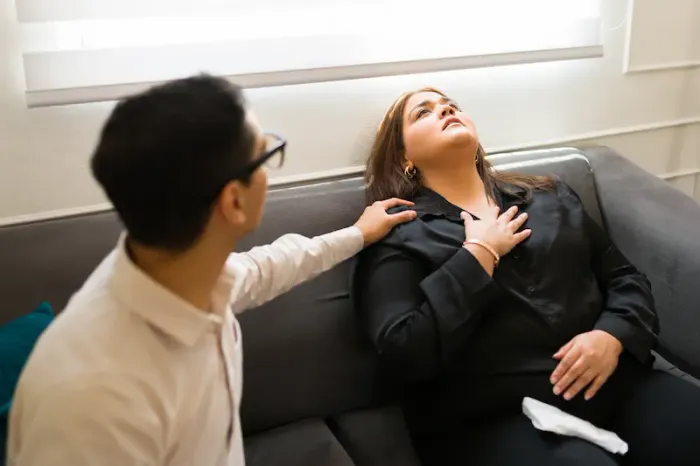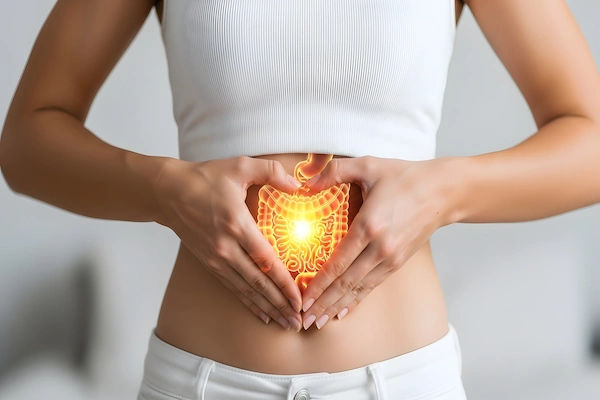Anxiety Attack vs Panic Attack: Key Differences and Symptoms
Anxiety attack vs panic attack explained. Learn differences, symptoms, causes, treatments, and when to seek help. Clear mental health guidance.

Written by Dr. Md Yusuf Shareef
Reviewed by Dr. Dhankecha Mayank Dineshbhai MBBS
Last updated on 13th Jan, 2026

Introduction
Many people use “anxiety attack” and “panic attack” as if they mean the same thing. They can feel similar, but they’re not identical. Knowing the differences helps you spot what’s happening in the moment, choose the right coping tools, and talk clearly with a healthcare professional. If you’ve wondered about anxiety vs panic, this guide breaks it down in simple, trustworthy language you can use to support your mental health.
What do people mean by “anxiety attack” and “panic attack”?
Panic attack (a clinical term)
A panic attack is a sudden, intense surge of fear or discomfort that reaches a peak within minutes. It can happen unexpectedly or in response to a trigger, and it often feels overwhelming.
Common panic attack symptoms include:
• Racing or pounding heart
• Sweating, trembling, or shaking
• Shortness of breath or feeling smothered
• Chest pain or tightness
• Nausea or stomach discomfort
• Dizziness, unsteadiness, or lightheadedness
• Chills or heat sensations
• Numbness or tingling (paresthesias)
• Feelings of unreality (derealization) or being detached from yourself (depersonalization)
• Fear of losing control or “going crazy”
• Fear of dying
Panic attacks are recognized in clinical guidelines and can occur on their own, as part of panic disorder, or alongside other conditions.
“Anxiety attack” (common language, not a formal diagnosis)
“Anxiety attack” isn’t an official medical diagnosis. People use it to describe a period of heightened anxiety—often linked to a stressor—that builds gradually and brings physical, mental, and emotional symptoms.
Common “anxiety attack” features include:
• Excessive worry or racing thoughts
• Restlessness or feeling “on edge”
• Muscle tension, jaw clenching, or aches
• Trouble concentrating
• Irritability
• Trouble sleeping
• Faster heart rate, stomach upset, or sweating (usually milder and more gradual than panic)
In short: panic attacks tend to be sudden and intense; what many call “anxiety attacks” tends to build more gradually and is tied to ongoing stress or worry.
Anxiety vs panic: key differences at a glance
Onset
• Panic: Abrupt surge; peaks within minutes.
• Anxiety: Gradual build with sustained worry.
Intensity
• Panic: Often severe, can feel overwhelming; a sense of impending doom is common.
• Anxiety: Varies from mild to moderate; often persistent, nagging distress.
Duration
• Panic: Intense phase often brief; symptoms typically lessen within minutes.
• Anxiety: Can last hours or days, tied to ongoing concerns.
Triggers
• Panic: Can be unexpected or triggered (e.g., specific situations).
• Anxiety: Usually linked to stressors (work, health, relationships).
Focus of thoughts
• Panic: Immediate fear of catastrophe (e.g., “I’m dying,” “I’ll lose control”).
• Anxiety: Future-oriented worry (e.g., “What if this goes wrong?”).
Clinical terms
• Panic attack: Defined in clinical manuals; part of conditions like panic disorder.
• “Anxiety attack”: Not a formal term; overlaps with anxiety symptoms (e.g., generalized anxiety disorder).
Shared symptoms—and how to tell them apart?
Symptoms that can overlap:
• Rapid heart rate
• Shortness of breath
• Chest tightness
• Sweating
• Trembling
• Stomach upset
Clues it’s more likely a panic attack:
• Very sudden onset with a quick peak
• Fear of dying or losing control
• Strong derealization/depersonalization
• Symptoms feel “out of the blue”
Clues it’s more likely a surge of anxiety:
• Stressor or worry you can identify
• Symptoms build over time
• Ongoing tension, insomnia, and irritability
What causes them? Risk factors and triggers
Many of the same factors can contribute to both panic and anxiety:
• Genetics and family history
• Brain chemistry and stress response systems
• Temperament (e.g., higher sensitivity to stress)
• Major life stressors, trauma, or significant changes
• Medical conditions (e.g., thyroid problems) and some medications or substances
• Caffeine, nicotine, and stimulant use
• Poor sleep or sudden sleep loss
Triggers can differ:
• Panic: Sometimes no clear trigger; other times, specific places or situations (like crowded spaces) or bodily sensations (like a racing heart) trigger fear.
• Anxiety: Often linked to ongoing stress (work deadlines, finances, relationship concerns, health worries).
When to seek help and when to get urgent care?
Seek routine care if:
• Attacks or anxiety are frequent, intense, or interfering with daily life
• You avoid places or activities for fear of an attack
• You have persistent worry, sleep problems, or low mood
• You use substances (alcohol, cannabis, stimulants) to cope
Get urgent medical care now if:
• You have new, severe chest pain, shortness of breath, fainting, confusion, or symptoms that could be a heart or respiratory emergency
• You have thoughts of harming yourself or others
• If you’re in immediate danger, call your local emergency number or go to the nearest emergency department. If you’re not in the U.S., contact your country’s crisis line or emergency services.
How clinicians evaluate anxiety vs panic?
A healthcare professional (such as a primary care clinician or a mental health specialist) will typically:
• Take a detailed history of symptoms, timing, triggers, and impact on life
• Ask about medical conditions, medications, and substance use
• Consider screening tools and clinical criteria for anxiety disorders, panic attacks/disorder, and related conditions
• Rule out medical problems that can mimic panic (e.g., heart rhythm issues, thyroid concerns, asthma)
• Work with you on a plan tailored to your needs and safety
Consult a Top Psychologist
What treatments help?
Effective care is available—and many people improve with the right plan.
Therapies
• Cognitive behavioral therapy (CBT): Teaches skills to change unhelpful thought patterns and reduce avoidance. Often first-line for both anxiety and panic.
• Exposure-based approaches: Safely and gradually face feared sensations or situations (especially helpful for panic).
• Mindfulness-based strategies: Build awareness and reduce reactivity to anxious thoughts and sensations.
Medications
• SSRIs and SNRIs: Common first-line medications for panic disorder and anxiety disorders.
• Benzodiazepines: Can reduce acute symptoms but carry risks (tolerance, dependence, drowsiness). If used, it’s usually short-term and carefully monitored.
• Other options in specific cases: Your clinician may consider additional medications based on your history and response.
Lifestyle and self-care for mental health
• Sleep: Aim for consistent, adequate sleep.
• Activity: Regular physical activity supports mood and stress resilience.
• Caffeine and nicotine: Cut back if you notice they worsen symptoms.
• Alcohol and other substances: Can worsen anxiety and sleep; discuss safer coping strategies with a professional.
• Nutrition and hydration: Steady meals and fluids can help reduce jitteriness.
Skills to use during an attack
• Slow, paced breathing: Inhale through the nose for about 4–5 seconds, exhale slowly for about 6–7 seconds. Repeat for a few minutes.
• Grounding: Try the 5-4-3-2-1 method—name 5 things you see, 4 things you feel, 3 things you hear, 2 things you smell, 1 thing you taste.
• Label and normalize: “This is a panic attack. It’s intense but temporary. I’ve gotten through it before.”
• Temperature or movement: Splash cool water on your face or take a brief walk if safe.
• Use a plan: Keep a written coping plan or a calming playlist handy.
How to support someone during an attack?
Do:
• Stay calm, speak slowly, and validate: “I’m here. You’re safe. This will pass.”
• Offer simple choices: “Would you like to sit or step outside?”
• Guide to slow breathing or grounding if they want help
• Stay with them until symptoms ease
Don’t:
• Minimize (“Just relax”) or argue with their feelings
• Force deep breaths too quickly (can worsen dizziness)
• Push caffeine or energy drinks
• Crowd them if they want a bit of space
Prevention and everyday mental health habits
• Keep a regular routine for sleep, meals, and activity
• Schedule small, daily stress buffers (brief walks, stretching, mindfulness)
• Practice tolerating normal body sensations (e.g., gentle cardio) so they feel less alarming
• Build social support and enjoyable activities
• Consider therapy early—skills learned before a crisis can prevent escalation
Choosing care for anxiety vs panic
Both anxiety and panic are treatable. If you’re unsure where to start, a primary care visit or a consultation with a licensed mental health professional is a great first step. Clarifying anxiety vs panic helps you get the most effective tools for your situation—and strengthens your overall mental health.
Consult a Top Psychologist
Consult a Top Psychologist

Dr. M Shyamala Devi
Psychologist
33 Years • DCH, MRCP, MRCH
Chennai
Apollo Children Hospitals Greams Road, Chennai

Dr. Richa Kumari
Psychiatrist
10 Years • MBBS, DPM (Psychiatrist)
Bangalore
Apollo Clinic Bellandur, Bangalore
(175+ Patients)

Ms. Moumita Ganguly
Psychologist
13 Years • B.ED(Special) Visual Impairment , PG.Diploma in Rehabilitation psychology
Kolkata
M’s Clinic, Kolkata
(150+ Patients)

Ms. Sridevi
Counselling Psychologist
5 Years • BSC,MSC Clinical Psychology
Bengaluru
Apollo Medical Center, Marathahalli, Bengaluru

Ms. Mansi Kothari
Psychologist
7 Years • MA - Psychology
Gurugram
Soulful, Gurugram
(75+ Patients)
Consult a Top Psychologist

Dr. M Shyamala Devi
Psychologist
33 Years • DCH, MRCP, MRCH
Chennai
Apollo Children Hospitals Greams Road, Chennai

Dr. Richa Kumari
Psychiatrist
10 Years • MBBS, DPM (Psychiatrist)
Bangalore
Apollo Clinic Bellandur, Bangalore
(175+ Patients)

Ms. Moumita Ganguly
Psychologist
13 Years • B.ED(Special) Visual Impairment , PG.Diploma in Rehabilitation psychology
Kolkata
M’s Clinic, Kolkata
(150+ Patients)

Ms. Sridevi
Counselling Psychologist
5 Years • BSC,MSC Clinical Psychology
Bengaluru
Apollo Medical Center, Marathahalli, Bengaluru

Ms. Mansi Kothari
Psychologist
7 Years • MA - Psychology
Gurugram
Soulful, Gurugram
(75+ Patients)
More articles from General Medical Consultation
Frequently Asked Questions
1) Is an “anxiety attack” the same as a panic attack?
No. “Anxiety attack” is a common phrase for a surge of anxiety tied to stress and worry. A panic attack is a sudden, intense episode of fear or discomfort that peaks within minutes and has defined symptoms. They can overlap, but they’re not identical.
2) How long does a panic attack last?
The intense peak typically develops and subsides within minutes, though some symptoms can linger longer as your body settles. If you have new, severe chest pain or trouble breathing, seek urgent medical care.
3) Can anxiety turn into a panic attack?
Yes, sometimes. Escalating anxiety, especially with hyperventilation and catastrophic thoughts, can precipitate a panic attack. Learning early coping skills (paced breathing, grounding, CBT techniques) can help reduce that escalation.
4) Are panic attacks dangerous?
They feel frightening, but they are not inherently dangerous by themselves. Still, it’s important to rule out medical conditions that can mimic panic and to seek care if symptoms are frequent or disruptive.
5) What treatments work best?
CBT and related therapies are highly effective for many people. SSRIs or SNRIs are common medication options. A tailored plan—often combining therapy, lifestyle changes, and, if appropriate, medication—works best. Talk with a qualified clinician to choose what fits your needs.




